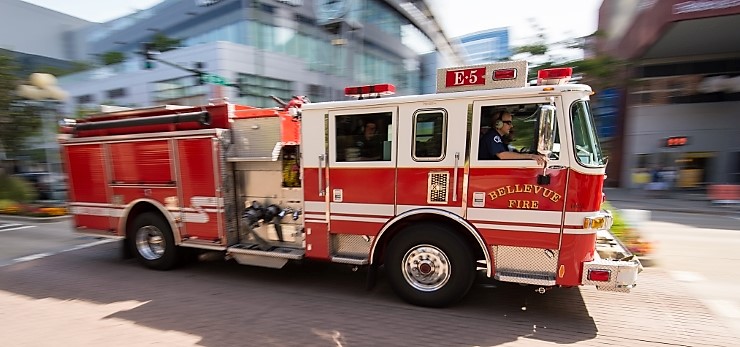
By Douglas Esser
Surprising but true, many firefighters spend only a fraction of their time fighting fires. Most of the time firefighters speed down the road with flashing lights and blaring sirens they’re rushing to a medical emergency. In Bellevue, 80 percent of the calls are for emergency medical services, said the fire department’s Heather Wong.
Wong is the department’s sole community risk reduction specialist. Along with AmeriCorps outreach intern Claire Phillips, they are the people responsible for promoting ways to head off some of the 911 calls about heart attacks, falls or some other medical crisis.
Facing that challenge, they were pleased to have help from a class of University of Washington Bothell nursing students in the RN to BSN program. It was part of the Livable City Year (LCY) program, a partnership between the University of Washington and the city of Bellevue.
Real experience
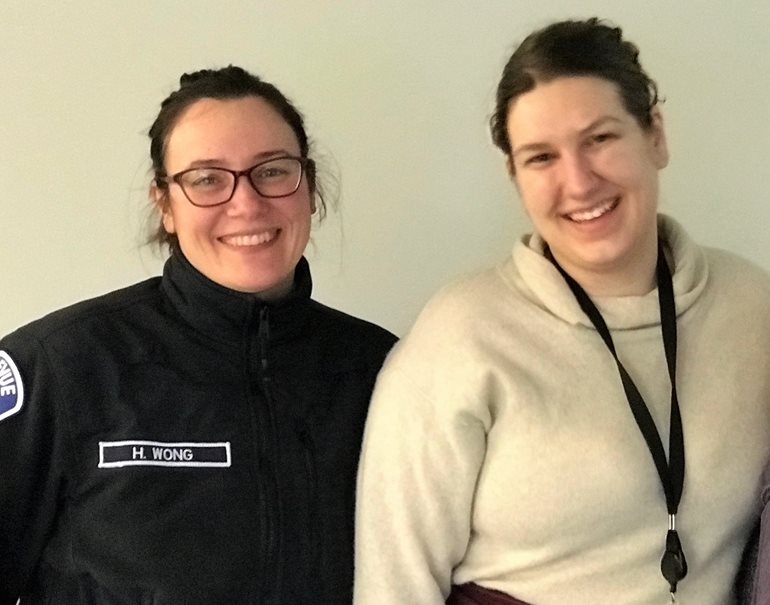
At the beginning of winter quarter, Wong and Phillips met with students in the Population-based Health in Community Practice course taught by Annie Bruck, senior lecturer in the UW Bothell School of Nursing & Health Studies. Together they developed five projects for teams of nurses to take to the community.
Students surveyed citizens and distributed information at community centers, the library, the Crossroads mall, a homeless shelter and a residence for the elderly. Feedback to the fire department gave Wong and Phillips information they can use to target their efforts.
Wong and Bruck say the winter quarter project has laid the foundation for what they hope will be an ongoing partnership. It also gave nursing students real-world experience in community health. The teams presented their projects in March at a Bellevue fire station:
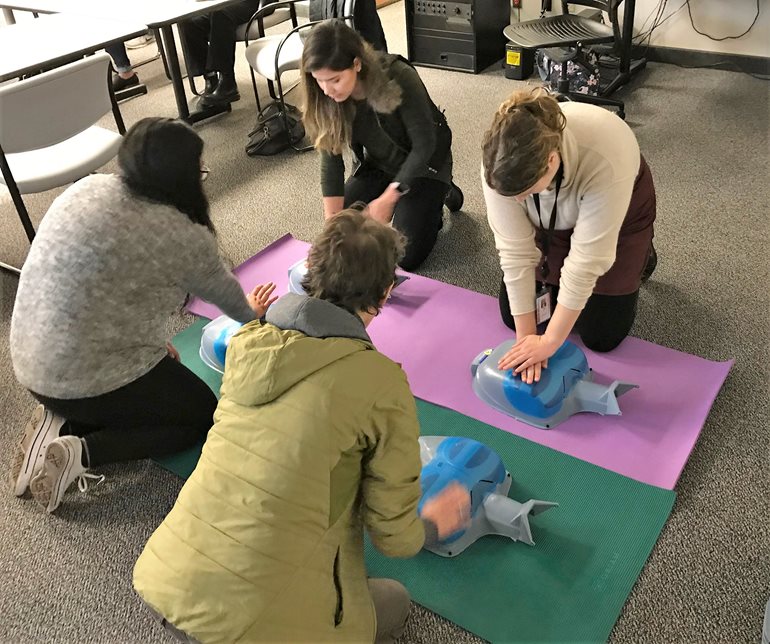
Staying alive
In addition to handing out information and surveys, the CPR team demonstrated the chest compression technique. They suggested thinking about the disco hit “Staying Alive” for the right beat. Discovering citizen interest in CPR certification, the team recommended offering classes at more times.
Do not resuscitate
Have you filled out a POLST form? Do you know what is? That’s what another team asked elderly residents. The Physician Orders for Life Sustaining Treatment (POLST) is a summary of your wishes for emergency care, such as do not resuscitate. They suggested posting the POLST on your refrigerator where 911 crews know to look for one. The nurses recommended that doctors’ offices and clinics distribute the form.
Helping the homeless
A lack of foot care for the homeless can result in sores and infections that may lead to amputations, said nurses who visited a shelter. Something as simple as dry socks could prevent life-changing emergencies. The nurses recommended spending more on preventative care to avoid resource-draining chronic care.
Barriers to 911
Many people in Bellevue who speak little or no English are unfamiliar with the conventions of calling 911, another team of nurses found. Some don’t realize it’s a free service or they fear revealing their immigration status. The nurses recommended producing information brochures in more languages and informing children who might translate a 911 call for a parent.
Frail and falling
For older adults, a serious fall can be the beginning of the end. A broken bone not only affects quality of life, it affects their ability to care for themselves, which may force a move to a nursing home. Nurses found the elderly resist thinking about being old and frail. Nurses recommended that information about preventing falls emphasize the concept of self-determination.
Helping Bellevue
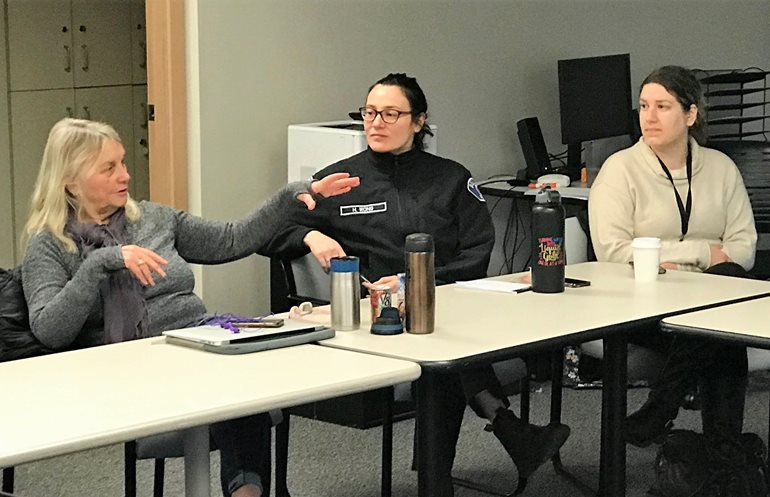
Wong and Phillips said the partnership with UW Bothell nurses was a success.
“We’ve been making assumptions, and now we have some actual data,” Wong said. “To have actual nurses going out in the community and learning what our community needs are is invaluable for me.”
The fire department can act on some recommendations, such as CPR classes, right away, Wong said. “We are now looking into offering a certification on a Saturday afternoon or maybe a Friday afternoon where more parents can get that.”
Phillips said the nurses also forged new connections in the community for promoting health and safety.
“Every group made such great strides in areas we’ve been really interested in pursuing. The fall prevention group was able to translate material into Russian, and we have a huge Russian elderly community,” Phillips said. “They were able to go in so many different directions and find out invaluable information we’ll be able to use.”
Helping students
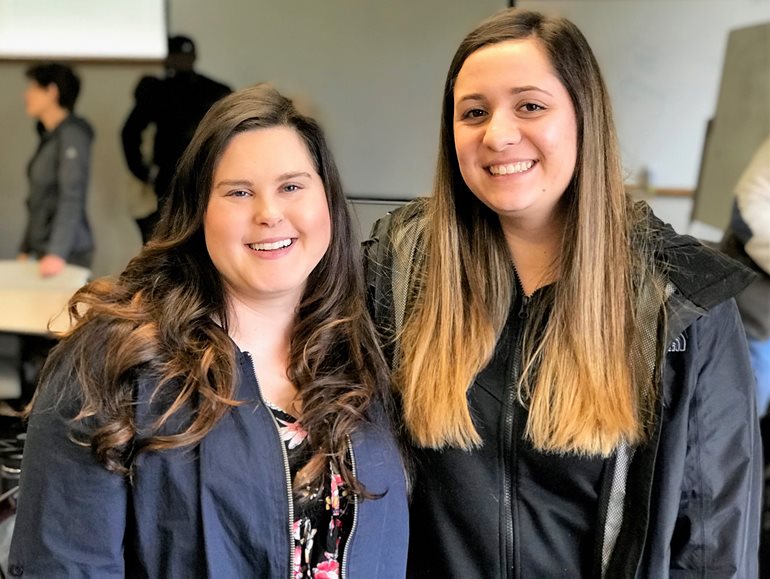
Jessica Turner is a BSN student graduating in June who works as a cardiology nurse at St. Joseph Medical Center in Tacoma. She liked gaining experience outside the hospital and the credibility that came from working with the fire department.
“We were able to take our knowledge from work and apply it in the community,” Turner said. “Being able to work with the Bellevue Fire Department, that really helped us get our information out, because they are trusted community members.”
Christina Wimmer, also graduating in June with a BSN degree, works as an orthopedic nurse at Northwest Hospital in Seattle. She said the experience gave her a new perspective.
“I liked seeing another style of nursing — getting out and not being in your set place where you do the same thing practically every day — and having to adjust when you go out into the community to meet the needs of the people you’re working with,” she said.
Advancing livability, sustainability
Earlier in the LCY program, UW Bothell Interactive Media Design students taught by Mark Chen suggested some ideas for redesigning the city of Bellevue’s website. Business students taught by Michael Ervick presented ideas for supporting tech startups.
Bruck welcomed the LCY opportunity for her students and was enthusiastic about the outcome.
“I thought, what a unique opportunity for nursing to be represented within this framework,” Bruck said. “The students did fabulous. Their outreach efforts were phenomenal. They gave Heather and Claire information they haven’t had before.”



